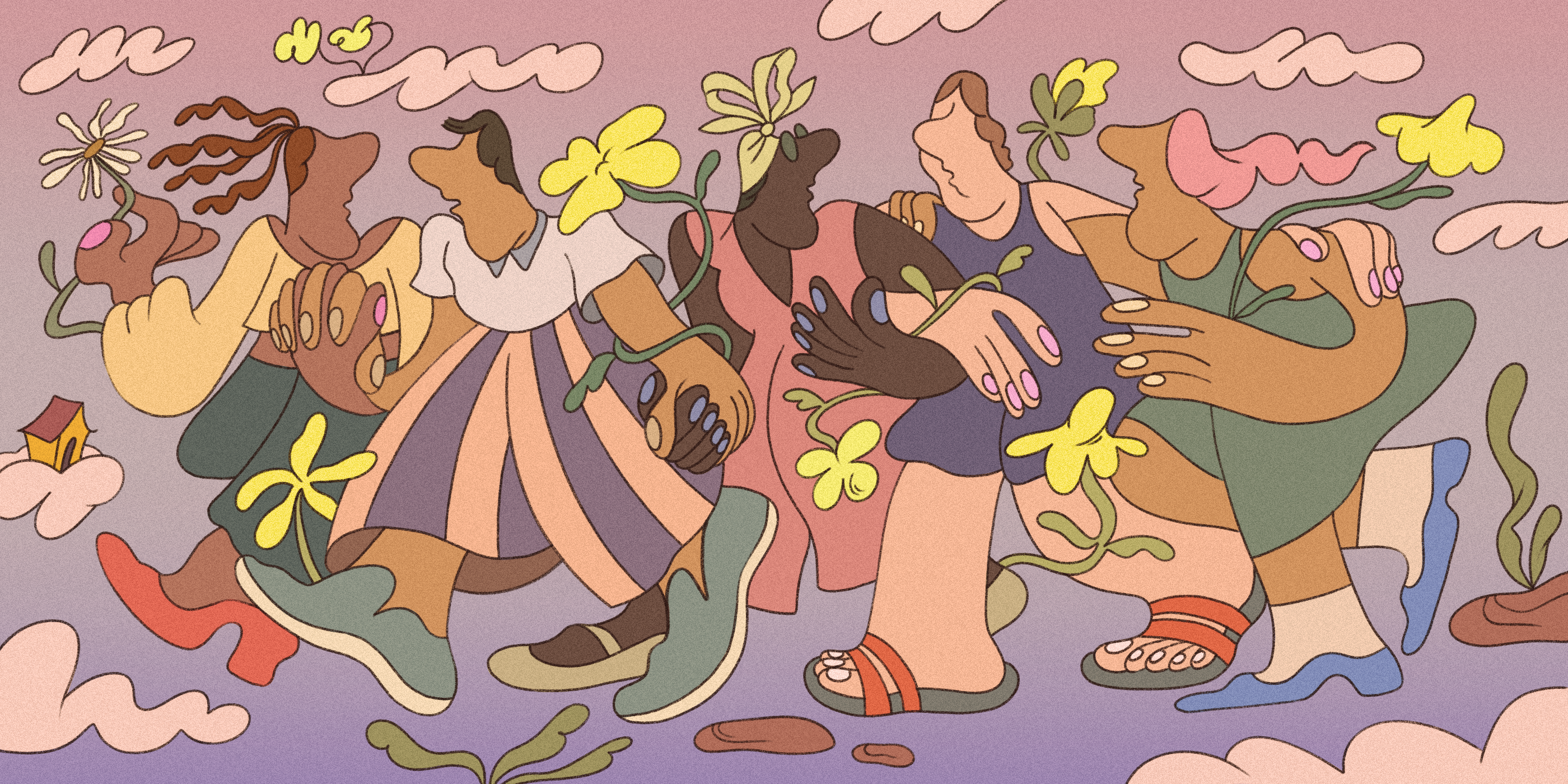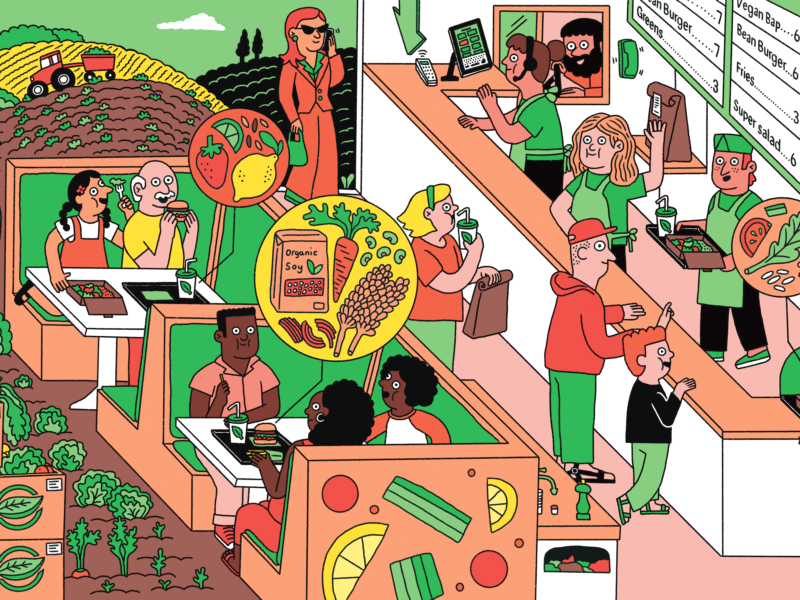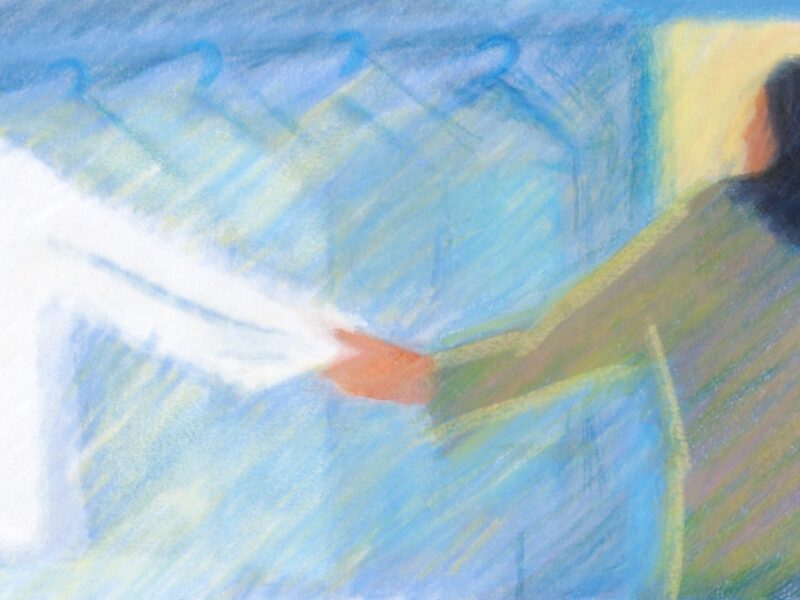In order to gather the people you love, sometimes you have to make a plan.
“Old Friends” is an ongoing series exploring the many ways that friendship changes shape in adulthood.
It started as an aspirational text between buddies: “I want to run away somewhere for a month and just disappear.” I’d sent it to my friend Matt in a fit of pique. I was on my fourth daily hour of Zoom fatigue, my twentieth month of consistent burnout. The text was an ice pack to the soul, a delusional light at the end of the tunnel, completely untethered to reality. So I was surprised by the speed of his response:
“OK but yes. Let’s do it.”
Matt’s and my platonic love story was born in proximity, forged in the fires of our twenties and a New York media office. At first, we were just wallpaper to each other’s daily lives. It was in the commuter crush of the Q train that real love formed. We’d talk about our flailing twenties, our pasts, and what we were working towards. There was a through line for us both: a steadfast commitment to creativity, to love in its many forms, and to making space in which we could become our best selves. At the time we were young and broke, stealing bananas from the office kitchen for sustenance. But we dreamed of growth, of room to write and play—and of travel. Before long, our commutes turned to regular walks around Gramercy Park, to writing dates, and to my first ever trip abroad: Matt, my roommate Brittney, and I absconded to Paris for the ultimate Friendsgiving.
Eventually, as these things go, I moved across the country. The structure of us shifted. Matt and I would FaceTime, send voice notes and TikToks and check-in texts, but it wasn’t the same. Proximity in friendship is a privilege that rarely lasts forever; we were used to this. Distance became de rigueur, especially as the pandemic raged on. Both Matt and I were run down. We felt boxed in. I battled panic attacks that had become commonplace at work. I craved the metaphorical wide open spaces Matt and I had daydreamed about years before on the Q. I needed something.
Luckily, Matt and I were the kind of buds who frequently exchanged travel fantasies. Our long distance love language had taken the form of links to hotels and Airbnbs in far-flung places. These plans were always both serious and unserious—part aspiration, part ambition. It was impossible to tell when a flight of fancy might go through chrysalis, willed into existence. We’d aged a thousand years since that first trip to Paris. The world had changed a thousand times, too.
A month after my text, Matt was in town for a conference, and he and I experienced something rare: the opportunity to sit on a couch together. We binged a season of Bridgerton in one sitting. That night I sat with him and another friend on my balcony, each of us balancing glasses of rosé, knowing very well we only had 48 hours to catch up on each other’s lives. There was an undercurrent of energy to this visit, too: Over the weeks preceding it, our fantasies about running away had taken on a tone of reality. On his last day we brought out our laptops. Matt sucked in a sharp breath and breathed out excitement, his octaves climbing: “It’s happening.” The only way to make this trip real, we’d realized, was to actually book the damn thing. We’d figure out the rest later.
We had until a month before the reservation to change our minds. But we knew once we hit “book” that it’d be done. So we did it.
Our place for August would be a villa in the Chianti Hills of Tuscany, with four bedrooms and five beds. After years living paycheck to paycheck, we were finally at a point in our lives where we could front the initial costs before the details were all ironed out. We were burnt out enough—experience-hungry enough—to just fucking do it already. But we also had our limits: Though Matt and I would have been happy wandering the Tuscan countryside just the two of us, if we were to be financially responsible, the plan would rely on filling the place with friends. People who could cut the costs into thirds, fourths, eighths—but who would also enhance this ambitious escape from our daily realities. The more we thought about it, the more people we wanted to invite into our world away.
We started contacting people. Friends we knew were itching to travel. Friends who shared the same fantasy of disappearing, even if only for a week. Friends we missed, who lived in different states or on different continents. Friends of all economic realities to whom that round trip ticket felt necessary to their very spirit.
It was not an all-encompassing effort, nor one that yielded only positive results. Some passed, some flaked, others yearned but couldn’t pull together the PTO or funds. As time to takeoff inched closer, Matt and I weren’t sure we were going to have much company at all. Anyone who’s tried to gather the whole group chat for dinner knows the feeling.
We blinked and months passed. Three weeks from when our villa would welcome us… and still, almost nobody had confirmed. We worried about the costs. Mentally, I calibrated what this month would be like in relative isolation.
But then, the tide turned. A friend from New York told us she’d be there for one of the weeks. A confidante from college followed shortly. A newer buddy, from Chicago, tiptoed onto the reservation. Her time would happily overlap with the friend from New York—who she happened to be close with from their days in college. Soon we’d hear from a friend in London, and one in Los Angeles. The latter would bring her long-distance best friend from Miami.
We’d wrangled eight people to join us, spread over twenty-four days. Friends from all different eras of our lives, and multiple who were strangers to either Matt or me. Another function of what we were doing became clear as we gathered the confirmations. We had always intended to create space, to go to a beautiful place where we could breathe and recoup. What I hadn’t taken into account was the thrill in my chest seeing who’d be there.
For me, the trip had originally been a haggard Hail Mary, a desperate attempt to escape burnout that had stopped me in my tracks. Those texts with Matt had been a temporary escape; now we were building a tangible one. My therapist’s grin spread to her eyes when I told her: This was a chance to rebalance, she said, to center myself. That I could be some small part of helping friends find their space to recoup, as well, only aided in that journey.
I know I’ll see these friends in other places eventually. I’ll see two of them at upcoming fall weddings, if only for a few hours here and there. If we’re lucky, work or family will take us to each other’s neck of the woods within the year. We’ll have dinner, or spend a night on each other’s couches. Then, inevitably, one of us will get on a plane and disappear back to their own time zone.
This trip will have a similar ending, but the very body of it will be different. Realizing the kind of time I’ll get with these people changes the shape of the whole experience. Our time, now, is a kind of summer camp, an adult friendship retreat—for some a recreation of a time where we were all living in the same space, and for others the first ever opportunity to do so, with fewer deadlines and pressures to boot. We will find space for ourselves. We’ll take our breaths. We’ll also commune with each other in ways we haven’t before, reshaping our friendships in a whole different kind of proximity.
In preparing for the trip, I scoured the aisles of Target. Into my cart I dumped a pack of Uno cards and 2009 favorite Cards Against Humanity. I bought a watercolor kit and a sketch pad. As I was checking out, I made a mental note to gather recipes that worked for groups; ones we could cook together while drinking and yelling and laughing.
Friendship changes shape in adulthood. They don’t warn you about that. “Your friends will move away!” they should say as they pass out caps and gowns. “They’ll scatter, find new partners and jobs and put their roots down far away from you.” They should tell you that when you do see these people it’s likely to be at a wedding, or at a funeral; through elusive FaceTimes or on brief holiday breaks. They should warn us early so we can shield our hearts. So we can know the reality: that in order to see these people you care about so much… you’ll have to make a plan. A deliberate, unfortunately expensive, frustrating, ever-shifting plan. But if you can make it happen, it will be worth it.
There’s a dull ache that comes with realizing you’ve lost track; the intricacies of intimate friends’ day-to-days become, at some fuzzy point, no longer automatic knowledge. It’s just natural. But in that villa forty minutes outside Florence, Matt and I will be roommates for a month. One friend will be there for fourteen days, another for nine, another for six. There’ll be plenty of bickering, plenty of long nights holed up in our individual rooms, the craving of quiet time. Alongside all that, though, will be friendships that have lived and changed over years—and friendships that haven’t even yet begun—colliding and congealing into something new.
As I write this, most of us are packing. Here are a few things I’m looking forward to: the drifting of eyelids as someone I haven’t seen in two years falls asleep before the movie’s over; the crick of a brow as they judge the cheese I chose for dinner; long, long walks, talking till we’re hoarse, finally saying out loud the nuance of a feeling we had months ago but are just now working through. The effort, financially and physically, that we all made to be there, and the ache I already feel for when it will be over. Friendship, when done right, is not fleeting. Time, however, is. What a relief then, to have made this space.



